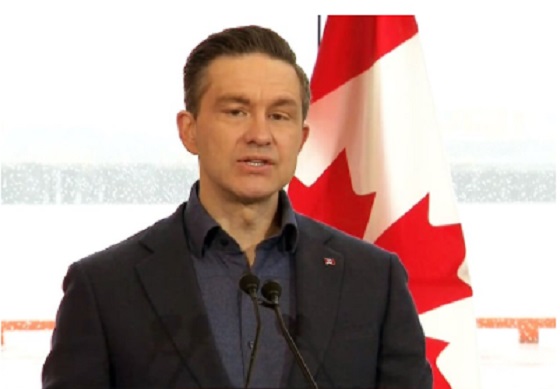Conservative Leader Pierre Poilievre announced that he will create a new ‘One and Done’ rule for resource projects: a one-stop shop, with one simple application and one environmental review. Poilievre also announced that he will rapidly approve 10 projects that have been stuck for years in the slow federal approval process. That will include Phase II of LNG Canada, a massive natural gas liquefaction project in Northern British Columbia. Many other projects will also be encouraged, all with an aim to bolster Canada’s economic independence against the Americans.
ONE-AND-DONE RULE will:
- Create a ‘One Stop Shop’ – A single office called the Rapid Resource Project Office will handle all regulatory approvals across all levels of government, so businesses don’t waste years navigating bureaucratic chaos and coordinating between multiple departments with different processes. We will cooperate with provincial governments to get all approvals into this single office.
- One application. End duplication – There will be one application and one environmental review per project, ensuring efficiency without sacrificing environmental standards. Instead of multiple overlapping studies that stall projects, governments will work together to deliver a single, effective review.
- One-year maximum wait times for approvals with a target of six months. There will be a target goal of decisions on applications in six months, with an upper time limit of one year, giving businesses certainty, cutting delays, and getting shovels in the ground faster.
“After the Lost Liberal decade, Canada is poorer, weaker, and more dependent on the United States than ever before, especially as a market for our natural resources,” said Poilievre. “My ‘One-and-Done’ rule will quickly and safely unleash Canada’s natural resources by rapidly approving the projects Canadians need more of now: mines, roads, LNG terminals, hydro projects, and nuclear power stations, so we can stand on our own two feet and stand up to the Americans.”
When completed, LNG Canada Phase II will double LNG output from 14 million to 28 million tonnes annually, creating hundreds of jobs in construction, operations and maintenance, and generating new revenues to fund the social programs that Canadians depend on. A new Conservative Government will also repeal C-69, the No Pipelines–No Development Law, and lift the cap on Canadian energy that would prevent LNG Canada Phase II from ever proceeding. Mark Carney has confirmed he will keep both C-69 and the cap in place.
Conservatives will also establish the Canadian Indigenous Opportunities Corporation (CIOC), to offer loan guarantees for local Indigenous-led resource projects.
A new Conservative government will also rapidly review nine other projects to find the hold-ups and accelerate federal decisions to get industry moving, workers working, and dollars flowing back to Canada. The full list of projects is at the end of this release.
Mark Carney and Steven Guilbeault’s “keep-it-in-the-ground” ideology–which maintains Bill C-69, the energy production cap, and the industrial carbon tax–will continue to stifle development in Canada, leading to job losses and increased reliance on foreign imports. Carney has said that “more than 80 per cent of current fossil fuel reserves … would need to stay in the ground.”
“The choice is clear: a fourth Liberal term that will keep our resources in the ground and keep us weak and vulnerable to Trump’s threats, or a strong new Conservative government that will approve projects, unleash our economy, bring jobs and dollars home, and put Canada First—For a Change.”
Some of the priority projects a Poilievre government will work with proponents and First Nations to approve:
- LNG Canada Phase II Expansion Project (BC): Aims to double LNG output but faces power supply challenges and output limitations related to the emissions cap.
- Suncor Base Mine Extension (Alberta): Expansion of an existing mine anticipated to produce 225,000 barrels per day of bitumen froth. Under assessment with the IAAC since 2020.
- Rook 1 Uranium Mine (Saskatchewan): A development-stage uranium project expected to be a major source of low-cost uranium. Approval process started in 2019 with the Canadian Nuclear Safety Commission.
- Springpole Lake Gold (Ontario): A proposed gold and silver mine with an on-site metal mill. Under assessment with the IAAC since 2018.
- Upper Beaver Gold Mine (Ontario): A proposed underground and gold and copper mine. Under assessment with the IAAC since 2021.
- Northern Road Link (Ontario): A proposed all-season, multi-use road in northern Ontario. Under assessment with the IAAC since 2023.
- Crawford Nickel Project (Ontario): A proposed nickel-cobalt mine with an on-site metal mill. Under assessment with the IAAC since 2022.
- Troilus Gold and Copper Mine (Quebec): A proposed gold and copper mine. Under assessment with the IAAC since 2022.
- Sorel-Tracy Port Terminal (Quebec): A proposed new port terminal in the industrial-port area of Sorel-Tracy. Under assessment with the IAAC since 2022.
- Cape Ray Gold and Silver Mine (Newfoundland): A proposed gold and silver mine with a milling complex. Under assessment with the IAAC since 2017.

































